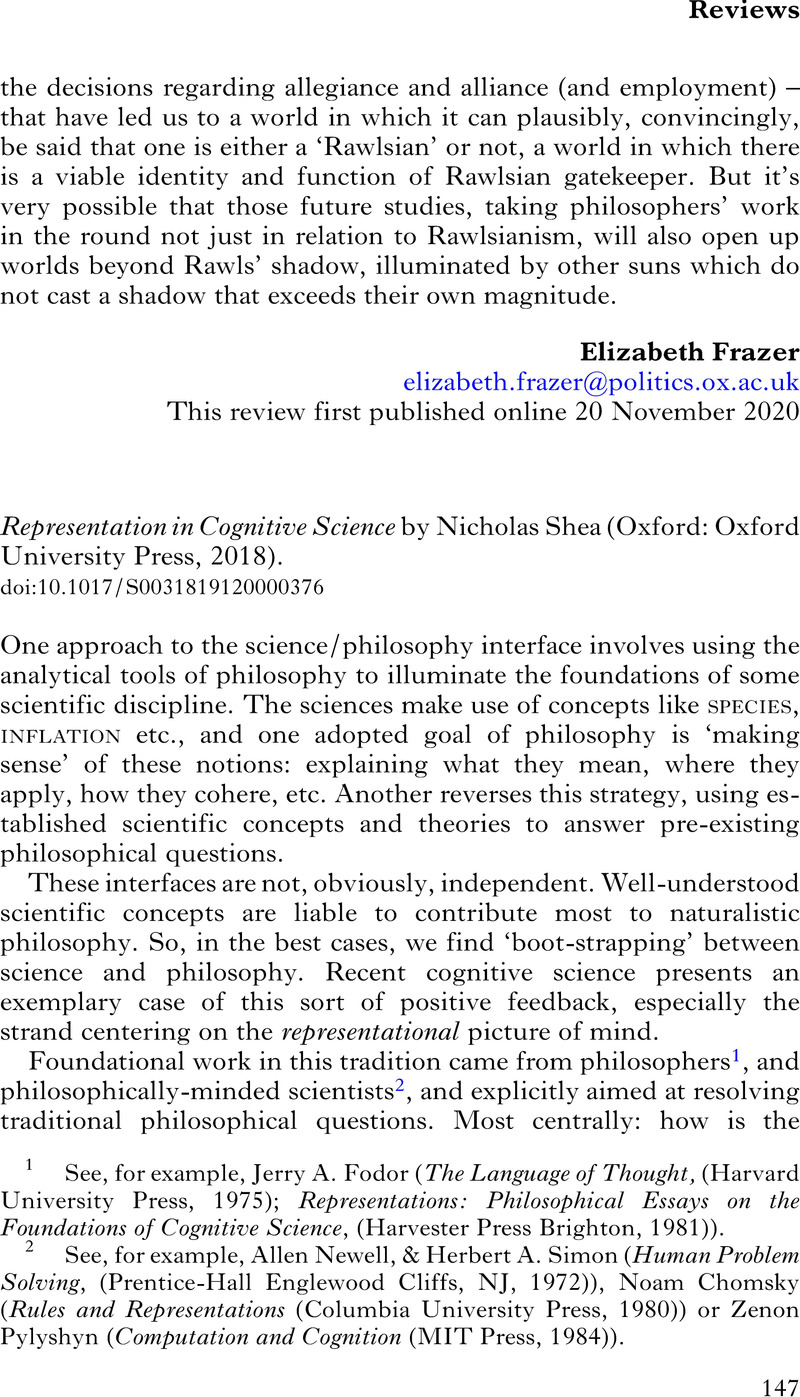No CrossRef data available.
Article contents
Representation in Cognitive Science by Nicholas Shea (Oxford: Oxford University Press, 2018).
Published online by Cambridge University Press: 16 November 2020
Abstract

- Type
- Reviews
- Information
- Copyright
- Copyright © The Royal Institute of Philosophy, 2020
References
1 See, for example, Fodor, Jerry A. (The Language of Thought, (Harvard University Press, 1975)Google Scholar; Representations: Philosophical Essays on the Foundations of Cognitive Science, (Harvester Press Brighton, 1981)).
2 See, for example, Newell, Allen, & Simon, Herbert A. (Human Problem Solving, (Prentice-Hall Englewood Cliffs, NJ, 1972))Google Scholar, Chomsky, Noam (Rules and Representations (Columbia University Press, 1980))CrossRefGoogle Scholar or Zenon Pylyshyn (Computation and Cognition (MIT Press, 1984)).
3 I am here ignoring the counter-current in cognitive science which aims to eliminate these representational notions. See e.g. Chemero, Anthony (Radical Embodied Cognitive science (MIT Press, 2011))Google Scholar for an overview of such an approach.
4 Another major aim of Shea's book (especially Chapter 8) is to show how such a project could be completed without thereby showing why the representational properties are redundant, i.e. of naturalizing semantics without showing that all the explanatory power of representational theories can be had without actually positing genuinely semantic properties. I will not say much about this issue in this review, but see Egan (Egan, Frances, ‘Content is pragmatic: Comments on Nicholas Shea's representation in cognitive science’, Mind & Language, (2020)CrossRefGoogle Scholar) for critical commentary.
5 Stemming from Dretske, Fred (Knowledge and the Flow of Information (MIT Press, (1981))Google Scholar and Millikan, Ruth Garrett (Language, Thought, and Other Biological Categories: New Foundations for Realism (MIT Press, 1984))Google Scholar respectively.
6 Shea discusses one further way that a behaviour can be stabilized: it can simply contribute to the persistence of the creature, as when earthworm bioturbation makes soil more suitable for earthworm life.
7 Being a stabilized robust outcome function is sufficient, but not necessary, for being a task function. Intentional design can provide the requisite normativity in lieu of stabilization. But for our and Shea's purposes this can largely be ignored.
8 Alternative views, such as that of Akins, Kathleen & Hahn, Martin (‘More than Mere Colouring: The Role of Spectral Information in Human Vision’, The British Journal for the Philosophy of Science, 65 (2014), 125–171)CrossRefGoogle Scholar and Chirimuuta, Mazviita (Outside Color: Perceptual Science and the Puzzle of Color in philosophy (MIT Press, 2015))CrossRefGoogle Scholar, deny that colour perception functions in this way, viewing colour as ‘constructed’ by the mind. These proposals are thereby more akin to the other example I will discuss, and pose problems for Shea in much the same way.
9 See Harnad, Stevan ((Ed.) Categorical Perception: The Groundwork of Cognition. (Cambridge University Press, 1987))Google Scholar for a classical discussion of the wide range of examples of categorical perception.
10 For discussion see Rey, Georges (‘In defense of Folieism: Replies to Critics’ Croatian Journal of Philosophy 8 (2008), 177–202)Google Scholar and much subsequent work.
11 This book was the topic of a reading group at the Center for Cognition Research, at the University of Reading. My understanding of Shea's theory, and the issues it raises, has improved greatly thanks to the participants in this group. Special thanks also to Nick Shea for attending a session of this group and answering our questions.





